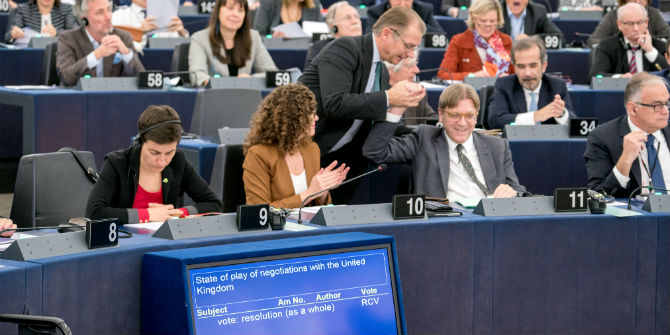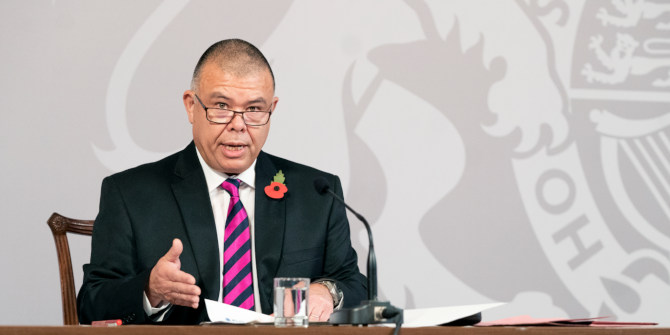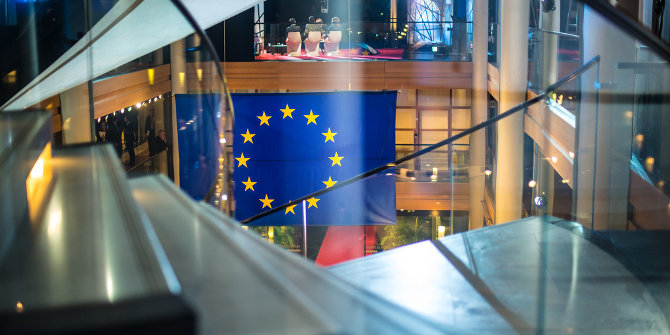France held the first round of its presidential election on 23 April, with Emmanuel Macron and Marine Le Pen making it to the second round. The centrist Macron is projected to have won 23.8 percent of the vote, while the Front National’s leader Le Pen came second with 21.5 percent. For the first time since the 1970s, no candidate from either mainstream party has made it through to the run-off, pointing at the possibility of a radical realignment in French politics.
Keep an eye on this page for more expert reactions coming in throughout the day.
- Marta Lorimer: “Macron is expected to win the election, but it is still unclear whether he will be able to govern”
- Thomas Vitiello: “The recomposition of the French left has started”
- David Lees: “It would be unwise to write off Le Pen just yet”
- Andrew Glencross: “Neither candidate would have made it this far if it was not for the confluence of short-term and long-term crises in French society”
- Nick Parsons: “The blurring of ideological divisions may make the run-off vote closer than expected”
 Marta Lorimer: “Macron is expected to win the election, but it is still unclear whether he will be able to govern”
Marta Lorimer: “Macron is expected to win the election, but it is still unclear whether he will be able to govern”
The results from the first round largely confirmed what pollsters had been expecting as the most likely outcome: a second round between Marine Le Pen and Emmanuel Macron. There are, however, some interesting takeaways from the election. First, while Le Pen had been expected to make it into the second round, she had also been expected to do so with a better score than the one she achieved. The key challenge for her now is to get a good score in the second round. While few expect her to win, she needs a good score to consolidate her leadership. Not all members of the FN were fully convinced with her strategy of ‘de-demonisation’ cum economic protectionism, and failing to deliver could harm her position as leader of the party.
Second, while Macron is expected to win the presidential election, it is still unclear whether he will be able to govern. France is a semi-presidential system, and to govern effectively, Macron needs a parliamentary majority. If he fails to win a majority in the legislative election in June – which could be a challenge, since he is still in the process of building his party – he could face an extended period of ‘co-habitation’ with a party whose support he does not fully command. In other words, he would have very little possibility to enact measures in his programme and in the long term, this could lead to even higher levels of disillusionment among the electorate.
Third, just like in Austria last year, neither of the established mainstream parties made it into the run-off. The run-off will pit a nationalist and protectionist candidate against a liberal Europeanist, suggesting that there may be a new cleavage emerging in France – one that goes beyond Left and Right and which entails a contest between ‘closed’ and ‘open’ visions of society. It will be interesting to see if this is confirmed in the legislative elections, but for now, it looks like a major shift in French (and European) politics is taking place.
Marta Lorimer – LSE
Marta Lorimer is a PhD candidate at the European Institute, London School of Economics. She holds a degree in European Studies from Sciences Po Paris and the LSE. Her research interests include far right parties, European politics and ideas of ‘Europe’.
___________________________________________
 Thomas Vitiello: “The recomposition of the French left has started”
Thomas Vitiello: “The recomposition of the French left has started”
Two political parties have dominated French politics under the 5th Republic: The Republicans (and its Gaullist predecessors), and the Socialist Party. In the first round of the 2017 presidential election, the combined score of their two candidates – François Fillon (20%) and Benoît Hamon (6.3%) – reached a record low of 26.3% of the votes. By comparison, their combined scores were 66% of the vote in 2007 and 55.8% in 2012. In particular, Hamon has lost more than 20 points compared to François Hollande in the first round of the 2012 presidential election.
One of the reasons for the shrinking electoral support for traditional parties is the emergence of new political movements – “En Marche!” and “La France Insoumise” – around the figures of Emmanuel Macron at the centre of the political spectrum, and Jean-Luc Mélenchon on the left of the PS. Hamon, who is a representative of the left-wing faction of the PS, could neither prevent social-liberal voters from drifting toward the more liberal Macron, nor compete with Mélenchon. The latter started his campaign months earlier and managed to successfully ‘own’ issues such as wealth redistribution and ecological transition, that is, both old and new left issues.
The emergence of these two political movements and the results of yesterday’s first round are an earthquake for French politics and in particular for the left as Macron scored 23.8% and Mélenchon 19%. While the presidency now seems to be in Macron’s hands, all eyes will soon look toward the parliamentary elections that will take place in June. The two-round runoff voting system is detrimental to new political actors, whether centrist or radical: the centrist François Bayrou in 2007 and the radical-right Marine Le Pen in 2012 both scored around 18% in the presidential election in April but then, in the June elections, their parties (Modem and the FN) only obtained 3 and 2 MPs respectively.
However, the crisis in the Socialist Party and the improbable emergence of a centrist majority in the June elections will reshuffle the cards for the recomposition of the French left. Whether it will be to the left with “La France Insoumise” or to the centre with “En Marche!”, is yet to be seen.
Thomas Vitiello – Sciences Po, Paris
Thomas Vitiello is a PhD student in political science at the Centre of Political Research of Sciences Po (Cevipof). He is a former Marie Curie Fellow from Sabanci University, Istanbul-Turkey; and he is the academic lead behind the French voting advice application of “La Boussole présidentielle 2017”.
___________________________________________
 David Lees: “It would be unwise to write off Le Pen just yet”
David Lees: “It would be unwise to write off Le Pen just yet”
Marine Le Pen has already achieved more in the first-round of the French presidential race than any previous far-right candidate. Le Pen’s first-round score of 21.53% of the vote is impressive, especially given Le Pen’s fairly unambitious campaign which drew mostly on pre-established policies from the 2012 presidential elections. Le Pen has sought to play on the insecurities of the French public in light of last week’s terrorist attack on the Champs-Elysées and will continue to ramp up her anti-immigrant rhetoric before the second-round on 7 May.
Crucially, she will seek to woo voters from the camps of both the extreme-left candidate Jean-Luc Mélenchon, who refused to back either Le Pen or Emmanuel Macron in his speech on Sunday evening, and from the centre-right François Fillon, who did urge his supporters to back Macron. Le Pen will draw on the concerns over employment and pay amongst Mélenchon voters and on traditional moral values and patriotism of Fillon supporters in order to increase her vote in the second-round. Macron’s development of a ‘non-establishment’ image will be sorely tested by Le Pen in the next two weeks as she plays on her greater political experience and ‘woman of the people’ image in the face of Macron’s investment banker past. With everything to play for, it would be unwise to write off Le Pen’s chances just yet.
David Lees – University of Warwick
David Lees is a Teaching Fellow in French Studies at the University of Warwick.
___________________________________________
 Andrew Glencross: “Neither candidate would have made it this far if it was not for the confluence of short-term and long-term crises in French society”
Andrew Glencross: “Neither candidate would have made it this far if it was not for the confluence of short-term and long-term crises in French society”
The French presidential election is essentially a contest to fill the gaping General-de-Gaulle-sized hole in the constitutional architecture of the Fifth Republic. In this guise, the run-off between Emmanuel Macron and Marine Le Pen is pretty conventional: both talk big and seek to appear as providential figures that can serve France’s true interests. But neither candidate would have made it this far if it was not for the confluence of short-term and long-term crises in French society.
The presidency was tailor-made for de Gaulle, which helps explain why centre-right candidates normally win it, as was originally expected this time around. After François Hollande became the first incumbent not to seek re-election (his approval ratings fell as low as 4%), François Fillon, candidate for Les Républicains, was the red hot favourite. A series of financial scandals proved his undoing. Yet the travails of the mainstream parties of left and right are not just the product of short term unpopularity.
Hollande’s presidential campaign was a classic tale of promising sweeping change – initially he declared himself an enemy of finance – and then settling for desultory micro-management of public policy. A social democrat in charge of a state with high levels of public spending and a deficit contrary to the rules governing the euro, he had very few cards to play and still managed his hand badly. The centre-right was unable to profit as they laboured under the shadow of former President Nicolas Sarkozy, whose political legacy is again one of failed promises and tainted by self-serving machinations.
Hence Macron and Le Pen have been successful in large part because of who they are not. Yet Macron carries the decades-long hopes of the centre-right and centre-left for a transformation of the economy that can satisfy unhappy voters and allow France to regain clout in the EU vis-à-vis Germany. As an independent centrist, he is also a republican bulwark against Le Pen’s extreme policies, as losing candidates such as Fillon and the Socialist Benoît Hamon have already stated. However, Le Pen can lose badly in the second round and still have time on her side. The Front National vote is the anti-system party with sticking power and profits each time a supposedly providential president fails to live up to expectations. The fundamental unknown for Macron’s presidency is thus whether he is in a better position to deliver because he lacks the baggage of the big political parties.
Andrew Glencross – Aston University
Andrew Glencross is a Senior Lecturer in the Department of Politics and International Relations at Aston University and a Senior Fellow at the Foreign Policy Research Institute.
___________________________________________
 Nick Parsons: “The blurring of ideological divisions may make the run-off vote closer than expected”
Nick Parsons: “The blurring of ideological divisions may make the run-off vote closer than expected”
Despite the closest electoral competition for many a year, the overall result was one predicted by the opinion pollsters. The centrist Emmanuel Macron will face the far-right Marine Le Pen in the 7 May run-off. The choice appears clear-cut, between the pro-EU, social-liberal Macron, arguing for more liberalisation and openness to rejuvenate the French economy, and the anti-EU, nationalist and protectionist Le Pen. It is notable, though, that these two candidates only secured just over 45% of the vote between them, compared to 56% for the two front-runners in 2012, when Hollande ran off against Sarkozy.
Normally, one would expect supporters of the traditional parties to coalesce around Macron to prevent the anti-system candidate from winning in the second ballot, as they did in 2002, when Jacques Chirac defeated Jean-Marie Le Pen with 82% of the votes. French politics, however, is now in a state of flux. Support for the two traditional parties of government collapsed, with the Socialist Party (PS) candidate, Benoît Hamon, only gaining 6.4%, while Macron has emerged as a political outsider despite his establishment background. One would expect the right-wing Les Républicains to ditch the scandal-mired Fillon and regroup for the legislative elections in June. The fate of the PS, however, is far less certain with internal recriminations and squabbling over the future direction of the party seemingly inevitable between left-leaning supporters of Hamon and those that supported Macron.
While Macron is expected to win the second ballot with about 60% of the vote, the blurring of ideological divisions may make the run-off vote closer than expected. Normally, one would expect Le Pen to struggle to extend her appeal beyond votes that went to the nationalists Dupont-Aignan and Asselineau. However, while most of Mélenchon’s supporters can be expected to support Macron, some may be attracted to Le Pen’s promises of economic protectionism to create jobs and protect welfare, while more may simply abstain, finding Macron’s mix of further economic liberalisation and austerity unpalatable. Likewise, Hamon’s support would normally translate into support for Macron, but many in the PS see him as a traitor, and may well seek refuge in abstention too. Fillon’s votes may well split more evenly, with his supporters divided between Le Pen’s anti-immigration policies and fear of the economic effects of her policies, notably the commitment to a referendum on withdrawal from the euro.
The real irony of this election is that the political outsiders – Mélenchon, Le Pen and Macron – did well, while traditional parties collapsed, but the likely ultimate victor on 7 May is essentially promising more of the same. Given the current divisions and state of flux in French politics, whether this is enough for him to secure parliamentary support for his presidential mandate, and whether the 2017 elections deliver strong and stable government for this, is very much still open to question.
Nick Parsons – Cardiff University
Nick Parsons is Reader in French in the School of Modern Languages, Cardiff University, and is a specialist in French and European industrial relations and social policy.
Please read our comments policy before commenting.
Note: This article gives the views of the author, and not the position of EUROPP – European Politics and Policy, nor of the London School of Economics.






re french political scene, Thomas Vitiello is spot-on on the short to medium term. who and how to govern are the real questions that will be asked for the second round (not Europe), in advance of the Lower House elections in June.
but Marta Lorimer has the real crux of the issue long-term for european political parties on how to reform themselves beyond the traditional left/right, statist/free-market ideologies
good analysis both.
thx